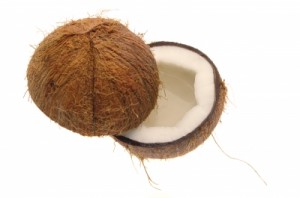Just joining? Click here for part one of these series on coconut oil!
The main reason that coconut oil, although a saturated fat, is not bad for your health is based in its unique chemistry makeup. Essentially, it all boils down to the way our body metabolizes coconut oil as opposed to other fats. Authors and nutritionist Marianita and Brian Shilhavy state,
“Researchers have known for quite some time that the secret to health and weight loss associated with coconut oil is related to the length of the fatty acid chains contained in coconut oil. Coconut oil contains what are called medium chain fatty acids, or medium chain triglycerides (MCTs for short). These medium chain fatty acids are different from the common longer chain fatty acids found in other plant-based oils. Most vegetable oils are composed of longer chain fatty acids, or triglycerides (LCTs). LCTs are typically stored in the body as fat, while MCTs are burned for energy. MCTs burn up quickly in the body. They are a lot like adding kindling to a fireplace, rather than a big damp log.” (Shilhavy, Marianita and Brian, 2013)
So because coconut oil is primarily composed of MCTs, it is uniquely burned as fuel in the body. Consider this succinct description of what coconut oil does in the body once it’s eaten. According to author Bruce Fife, N.D, an internationally recognized expert on the health and nutritional aspects of coconut and related products,
“…MCTs (medium chain tryglycerides) digest differently than other fats. When swallowed, most fats travel down the esophagus (throat), through the stomach, and into the small intestine where they are broken down by digestive enzymes and bile into individual fatty acids (long chain fatty acids). These fatty acids are then absorbed into the intestinal wall where they are repackaged into bundles of fat, cholesterol, and protein called lipoproteins. These lipoproteins pass into the bloodstream. As they circulate in the bloodstream they release little particles of fat and cholesterol that are utilized by the cells or stored as body fat…the process is completely different with MCTs. When MCTs are consumed, they digest very rapidly and begin breaking down immediately. When they pass from the stomach into the small intestine, they are already completely separated into individual fatty acids (medium chain fatty acids) and, therefore, do not need pancreatic digestive enzymes or bile for digestion, thus relieving stress on the digestive system. Since they are already in the form of fatty acids when they enter the small intestine they are immediately absorbed into the portal vein and sent directly to the liver. In the liver they are metabolized into energy.” (Fife, 2012)
Because of the unique way they’re metabolized, MCTs, unlike LCTs, do not enter the cholesterol cycle, are not deposited in fat depots, and do not cause obesity.
Sources:
Shilhavy, Brian and Marianita. “The Health Benefits of Virgin Coconut Oil.” CoconutOil.com, 2013. Web. Accessed July 10, 2013 from [http://coconutoil.com/health_benefits_virgin_coconut_oil/]
Fife, Bruce. “The Coconut Oil Miracle: Where is the Evidence?” Coconut Research Center, 2012. Web. Accessed July 10, 2013 from
[http://www.coconutresearchcenter.org/The%20Coconut%20Oil%20Miracle-Where%20is%20the%20Evidence.htm]
***In the next post, we’ll talk about the benefits of including coconut oil in your diet. We will see how it relates to obesity, diabetes, Alzheimers, and viral diseases in the body.

Jess Tull
July 26, 2013Brooke, I’m really enjoying reading about this! I have wondered about coconut oil, but had never taken the time needed to do extensive research on it. Thanks for posting this for us to read and learn from!!
~In Christ with Joy~
Jess
Brooke Noble
July 26, 2013Thank you, Jess! I’m so glad you’re enjoying it. :)
Kaitlyn
July 26, 2013This is really interesting to learn all this about coconut oil! We use it, but I have not really known much about it. Can’t wait for part 3!! :) Thanks!
Brooke Noble
July 26, 2013Thanks, Kaitlyn! It’s fun to be able to use this paper for both a homework assignment and my blog. :)
Pingback: The Case for Coconut Oil: Part 3 | Bungalow of Blessing The Case for Coconut Oil: Part 3 | His mercies are new every morning
Pingback: Ways to Use Coconut Oil | Bungalow of Blessing Ways to Use Coconut Oil | His mercies are new every morning